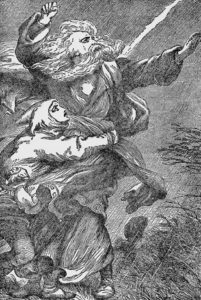I first learned about Alexander Barnett’s King Lear back in 2015. I’m happy to report that the project is finished, and I got to see a screener of the final product.
I’ve seen a few Lears in my time – Sir Ian McKellen’s version (2008), and of course Sir Laurence Olivier (1983). And I’ve seen it live twice. So I’ve got some amount of familiarity with the play. But let’s not kid ourselves, it’s King Lear, it is a monster. You could see it a dozen times and learn something new every time.
This is a pretty bare-bones production, almost a filmed stage performance. There’s minimal special effects to speak of, no soundtrack, and most of the action takes place in and around “the castle.” Once I got used to it, I liked it. Because I don’t really want to review an entire movie, going into the costumes and scenery and cinematography. I’ve been saying it for years, I’m here for the Shakespeare. I care about how the characters build based on how they deliver the lines, and how it all comes together in the big picture. (Compare the coming Anthony Hopkins version, which looks like it’s going to be all about everything but the text.)
I apologize in advance for not doing a detailed breakdown of every character, there’s just too many. With Lear, as with most Shakespeare, I tend to focus on my favorite scenes and characters.
We open with Gloucester joking with Edmund. The two both laugh together, Gloucester even delivering some playful punches on the shoulder to his bastard son. That makes Edmund’s betrayal that much more brutal. When Gloucester later says that Edmund will save him it’s not just “Edmund’s my new favorite now because Edgar betrayed me,” there’s actually a relationship there. It’s easy to hate Edmund. He’s got that constant smile that, once you learn to see right through it, makes you want to just knock it right off his face.
Later we’ll hear (but not see) Gloucester’s eyes being gouged out. The scene cuts to Goneril and Edmund in another part of the castle. Goneril is startled and pauses at the noise, but Edmund just looks at her impatiently as if to say, “Yes, and? Let’s go!” while his father is tortured.
I don’t know what to make of the Fool. He makes me uncomfortable. He’s got this kind of hyperactive thing going where he never stops moving, keeps focusing his attention on different things while he talks. I feel like I could watch the whole thing again just paying attention to him. Does he love the old man, or is he mocking him? Is he confidently commanding the scene when he tells his jokes and pokes fun at the king, or does he fear the whip?
Interesting decision – there’s a little moment where it appears clear that Fool recognizes Kent, who gives him the finger to the lips “Shhhhhh” gesture. I like that. Makes me think that Fool is smarter than he appears, and that the two are now a team, loyal to the king.
Shall we talk about Barnett’s Lear? Visually I really like what he’s done. The wild hair, the big bushy beard. From the minute he enters he looks…well, old. Not skeletal and frail, like Olivier did. He looks like an angry old man. There’s something in his eyes that is … elsewhere. Sometimes he loses his train of thought. He’s got a temper and is quick to anger. It’s no surprise that Regan and Goneril look like they’ve been planning for this day for a long time and are happy it has finally come.
I think the scene with Kent in the stocks is everything. Lear enters the scene thinking he has it all, and he leaves with nothing. Lear loses all control, bouncing back and forth between rage, confusion, bargaining. I like his interaction with Gloucester, how it’s laid out so plainly:
KING LEAR
Why, Gloucester, Gloucester,
I’ld speak with the Duke of Cornwall and his wife.
GLOUCESTER
Well, my good lord, I have inform’d them so.
KING LEAR
Inform’d them! Dost thou understand me, man?
GLOUCESTER
Ay, my good lord.
KING LEAR
The king would speak with Cornwall; the dear father
Would with his daughter speak, commands her service:
Are they inform’d of this?
It takes him so long to understand this idea of “the king said he wants this” and not have people jump to make it happen. He tries to contain his rage, but doesn’t succeed. Gloucester is the poor middleman who agrees completely that what’s happening is an outrage, but can’t do anything about it.
How’s the big final scene? Very interesting. Lear chooses to carry Cordelia on his back for much of it – right up to “Stay a little” (a line which they actually appear to have cut). It’s almost as if he’s so far gone at this point he forgets that he’s even got her physical body with him. There is no looking glass or feather, he imagines all of that.
Honestly I could write twice this amount and still find details I feel like I’m missing. I watched the whole thing, and then as I wrote this I went back through and paid closer attention to some key scenes. I also did my “speed reading” trick, leaving closed captions on so I had the text right there in front of me.
At the end of it all this is almost a one-man show. The other actors do an admirable job, but all of it is just there to move Lear’s story along. There’s not much direction to speak of beyond when and how to move the camera. As I mentioned there’s nothing additional added that’s not in Shakespeare’s text (something we’ll discuss in an upcoming post regarding the Anthony Hopkins version). That makes for a particular type of movie. Would I invite family and friends to sit down and watch this? Would we have gone to see it in a theatre? No. But as a student and admirer of Shakespeare will I go back over this multiple times, paying close attention to the performance of individual characters? Absolutely. I already have.
The full movie is available on Amazon Prime. It is also available to stream On Demand from Vimeo as a 12-part series.
Alexander Barnett is a highly acclaimed American theatre and film actor, director and writer. He founded Classic Theatre International and toured Europe for 18 years with the greatest Shakespearean tragedies and American classics. Returning to the States, he wrote and directed his first screenplay, The Eyes of Van Gogh. He is currently writing a new screenplay.
 I admit it, this post is a complete advertisement for my latest merchandise. I think I honestly do a pretty reasonable job of not spamming you folks every time I put up a new t-shirt design, don’t I? So surely you won’t begrudge me a Friday afternoon commercial.
I admit it, this post is a complete advertisement for my latest merchandise. I think I honestly do a pretty reasonable job of not spamming you folks every time I put up a new t-shirt design, don’t I? So surely you won’t begrudge me a Friday afternoon commercial.

 Let’s talk about King Lear for a second, since I’m in the middle of watching a new production (that I’ll be posting about shortly).
Let’s talk about King Lear for a second, since I’m in the middle of watching a new production (that I’ll be posting about shortly).